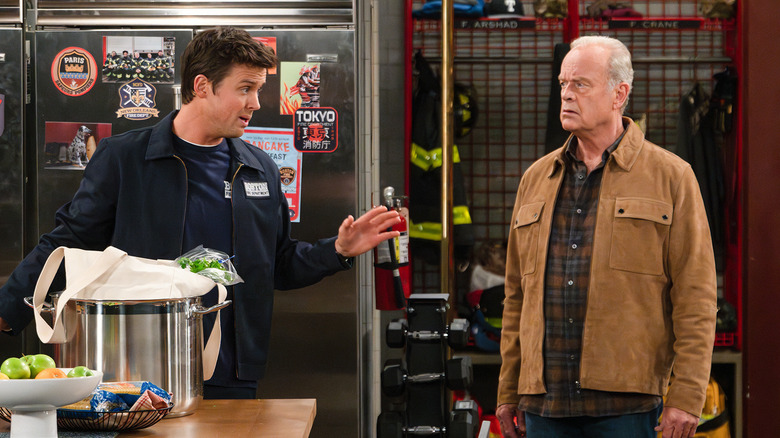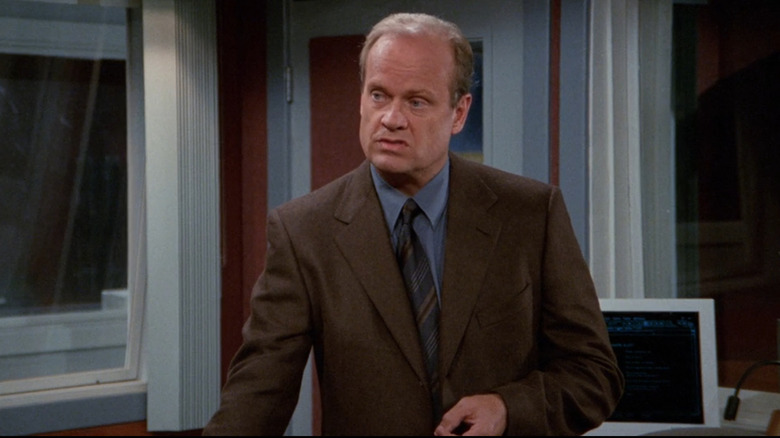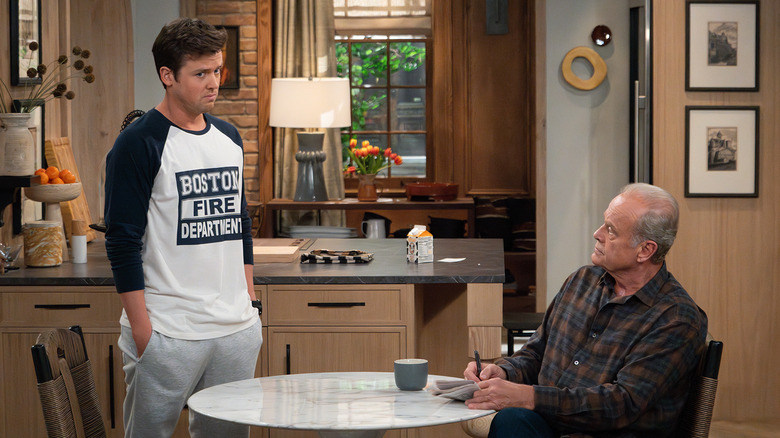The Frasier Revival Satirizes Dr. Crane's Snobbiness More Than The Original Series Ever Did
Frasier is a snob. It's a well established aspect of his character that made for some of the best jokes of the original sitcom's 11 seasons. But with the new "Frasier" revival series on Paramount+, something's changed.
Back when the show first debuted in 1993, Frasier's elitism was immediately played up as one of his major character flaws, and treated as a source of unending comedy. The clash of tastes between him and his blue collar retired cop father, Martin (John Mahoney), basically provided the central "sit" out of which the "com" arose.
There was also a heart to both the character and the show, which frequently became apparent as a result of the conflict between Frasier and his dad. For example, when the former threw out the latter's beloved recliner because it clashed with his apartment's more refined decor, Martin went on an extended monologue about why the chair meant so much to him, prompting Frasier to embark on a mission to recover it and mend his relationship with his father. It made for a touching moment and a hilarious episode that used Frasier's snootiness to both comedic and emotional effect without necessarily trying to change the protagonist's inherent nature.
The neither disappointing nor remarkable revival show, however, seems to want to transform our beloved snob.
The common touch
As the original series went on, the titular doctor's snootiness remained unchanged. The season nine episode "Love Stinks," kicks off with Frasier crestfallen to have discovered a bathroom "graffito" at his work which characterizes him as a "snob." Throughout the episode, Frasier's ego becomes increasingly bruised as more and more additions are made to the offending Latrinalia, with the psychiatrist noting that he's "read anthologies with fewer contributing authors." But by the end, Frasier becomes the popular everyman he thought he wanted to be, only to resent having to make small talk with people with whom he has nothing in common — essentially reaffirming that Frasier is and always will be a bit of a snob.
In Seattle, Frasier's equally pretentious brother Niles (David Hyde Pierce) provided him with not only the perfect banter partner, but with an enabler of his own snootiness. The interactions between the pair made for some of the show's best and often wittiest writing. Take the opening scene from "Love Stinks," for example, in which Frasier claims he's always striven to embody the line from Rudyard Kipling's poem "If—": "If you can talk with crowds and keep your virtue, Or walk with Kings — nor lose the common touch." According to Dr. Crane, his "maligner" would have found this a more apt characterization if he really knew Frasier, to which Niles replies, "Assuming he's familiar with Kipling," prompting his brother to add, snidely, "What are the odds." It's an amusing, tightly-written, and witty scene that showcases how "Frasier" treated its protagonist's snobbery throughout — as a joke that Frasier will never get.
In the revival show, however, the writers seem to want to force a confrontation between the doctor and his own hifalutin tastes, and perhaps somehow "fix" Frasier.
More laughs, less lessons
The new series isolates Frasier from his main enabler, Niles, and surrounds him with characters who more closely resemble his father, Martin. His son Freddy (Jack Cutmore-Scott), his roommate Eve (Jess Salgueiro), Frasier's nephew David (Anders Keither), and even his Harvard colleague Alan (British comedy legend Nicholas Lyndhurst) don't care about the finer things in life, if they don't outright resent them like Freddy.
The result is a series where, so far, the primary butt of the joke has been Frasier's ego, while his pretentiousness is treated more like a character flaw requiring a swift remedy. Freddy calls out his father's elitism throughout the early episodes by highlighting the obvious fact that Frasier looks down on his job as a firefighter and resents the fact that his son dropped out of Harvard. Episode four in particular focuses on this issue, with Freddy inviting Frasier to his firehouse so he can see, first-hand, how important and serious a job it is.
Rather than mining Frasier's elitism and the way in which it separates him from loved ones for laughs, this storyline seems to only want to demonstrate the latter, showing how Frasier alienates his son by expecting too much. That seems to suggest the show hasn't grasped that Frasier's elitism is part of what made him charming. He's always been lovably pretentious, after all — partly because he's never able to understand how his upper-class tastes come across as snobbery rather than sophistication. In the original sitcom, that never undermined the character's inherent morality, so there's no reason why he needs to be "fixed" now. As it goes on, let's hope the revival show can lean more into mining Frasier's elitism for laughs rather than lessons.
New episodes of "Frasier" premiere every Thursday on Paramount+.


